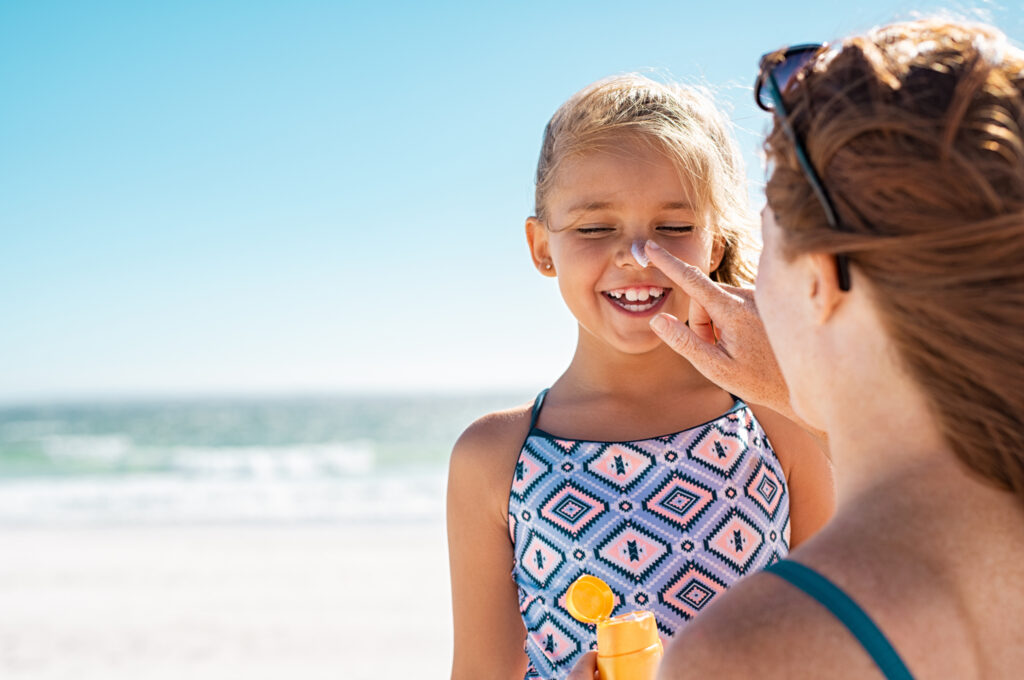At Thibodaux Regional Urgent Care – Houma, we recognize the importance of protecting your skin, especially in the warmer months when the sun puts us at a higher risk of sunburn when spending time outdoors.
Sunscreen is one of the most effective ways to protect our skin against UV damage that could lead to future skin problems, such as brown spots, uneven skin tone and even skin cancer.
With hundreds of brands and SPF numbers available on the market, it can be hard to decide precisely what SPF level is right for you.
The truth is the SPF you should be using depends on various factors, including your age, skin type and level of sun exposure. It is also important to remember that depending on the activities and time in the sun, some days, you may need a different SPF than others for better protection.
We understand that deciphering the numbers on each bottle of sunscreen can be overwhelming; that’s why we are here to break it down for you.
If you or a loved one has a severe sunburn, we can help. Don’t delay treatment; visit us today for a thorough evaluation and burn care. The health of your skin is vital.
Let’s discuss SPF factors and proper sunscreen application techniques in further detail.
First, What Is SPF?
SPF stands for “sun protection factor.”
It measures how well a sunscreen will protect your skin from UVB rays. These sun rays affect the skin’s surface and can lead to sunburn, damaged skin cells, or more serious and life-threatening conditions such as skin cancer.
Sunscreen Types
As you browse store shelves, you’ll notice a variety of sunscreen options available in varying ranges of SPF.
Outside of the SPF number, the most common sunscreen products include
- Sport
- Waterproof
- Water Resistant
- Spray
- Balm
- Facial-Specific
- Broad Spectrum
- Babies and Kids
- All-Natural
There may also be options that promote a way to get a sun tan without burning, but we don’t recommend those, as they are usually extremely low in SPF and work differently for everyone.
No matter what option you choose, the most important factor is the amount of SPF coverage.
What SPF Is Recommended When Selecting Sunscreen?
SPF comes in various strength levels, which all serve one purpose: to aid in protecting your skin for a certain period of time.
Most sunscreens range from 5 SPF to 100 SPF or higher.
Although the market includes highly-numbered SPF options, it is a good rule of thumb to know that anything over SPF 30 provides almost the same amount of coverage.
You should choose a sunscreen that is at least SPF 15 but does not have to exceed anything over SPF 30.
The most common SPF coverage amounts are as follows:
- SPF 15 blocks 93% of UVB rays
- SPF 30 blocks 97% of UVB rays
- SPF 50 blocks 98% of UVB rays.
How Is SPF Calculated?
For the purpose of discussing SPF calculation, we will use SPF 15 as our example in the following breakdown.
If your skin normally burns in the sun after 10 minutes of exposure, an SPF of 15 would provide 15 times the amount of protection, or 150 minutes, in the same environment.
This is an estimate, and the exact protection time depends on your unique skin type, the overall level of exposure, and the intensity of UVA and UVB rays you are exposed to.
The same calculation can be used for each SPF number. So, SPF 50 would provide 50x the coverage amount and so on.
Although most people use SPF to estimate the amount of time they can spend in the sun before re-application is necessary, the SPF number should be used more to measure overall protection to ensure the skin is as protected as possible.
The Amount of Sunscreen You Apply is Equally as Important as SPF.
You may not know this, but most people do not apply enough sunscreen before heading out into the sun.
The proper amount of sunscreen for all ages is about one ounce per full-body coverage or 2mg/cm2 of skin.
Sunscreen reapplication is just as necessary as initial coverage. You should reapply sunscreen every 2 hours, even if you determine that your SPF may last you longer.
You may want to consider applying your sunscreen more often if you sweat a lot or spend time in the water.
Comprehensive Burn Care When You Need It Most
If you are experiencing severe symptoms of sunburn, such as a fever, blistering, or unrelenting and intense pain, you should seek treatment at Coast Urgent Care of Houma now.
Our experienced team is available daily to provide the burn care you need to start feeling better sooner, especially if your sunburn is serious.
Don’t delay; get seen today. No appointment is necessary, and walk-ins are welcome seven days a week.




